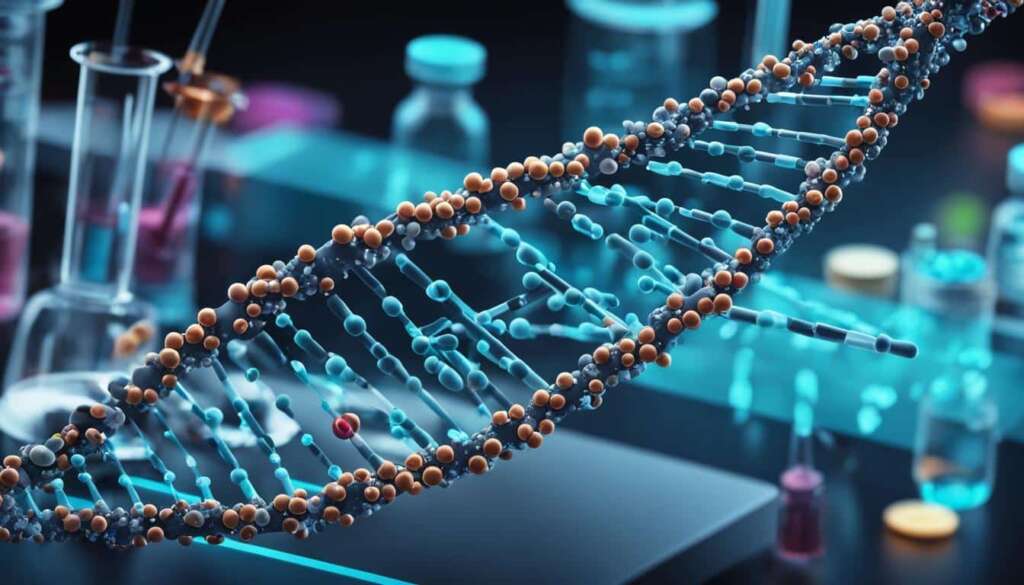Table of Contents
Nanotechnology engineering is a marvel of intricate innovations. This field has the potential to revolutionise various industries and enhance our daily lives through manipulating matter on a molecular and atomic scale.
Working with materials and structures in the nanometer range (1-100 nanometers), nanotechnology allows for precise creation and manipulation of materials. Its applications in electronics, medicine, energy production, environmental remediation, and more are truly astounding.
Key Takeaways:
- Nanotechnology engineering manipulates matter on a molecular and atomic scale.
- It has incredible applications in electronics, medicine, energy production, and environmental remediation.
- Nanotechnology allows for precise creation and manipulation of materials.
- The field has the potential to revolutionise various industries and enhance daily lives.
- Nanotechnology engineering is a marvel of intricate innovations.
Enhancing Electronics Through Nanoscale Innovations
Nanoscale materials have revolutionized the electronics industry, enabling the development of smaller devices with enhanced capabilities. By shrinking transistors and other components to nanoscale dimensions, researchers have unlocked a new level of efficiency and performance. This has led to advancements in computing power, faster processors, and increased data storage capabilities.
One of the key advantages of nanoscale innovations is the ability to create smaller electronic devices. The miniaturization of transistors and circuits allows us to pack more functionality into compact form factors, leading to the development of sleeker and more portable gadgets.
Moreover, nanoscale materials have paved the way for the creation of efficient processors. With smaller components, electrons can traverse shorter distances, reducing energy loss and improving computational speeds. This translates to faster and more responsive devices, improving user experience and enabling complex tasks to be completed in less time.
Additionally, nanotechnology has significantly impacted data storage. Through nanoscale innovations, manufacturers have been able to increase the storage capacity of devices, allowing for the storage of vast amounts of data in compact formats. This has been crucial in meeting the ever-growing demand for data storage in our increasingly digital world.
Furthermore, the use of nanoscale materials has also enabled advancements in the field of quantum computing. Quantum dots and other nanoscale components hold the key to developing more powerful and efficient quantum computers, bringing us closer to solving complex real-world problems in fields such as drug discovery, cybersecurity, and optimization.
To illustrate the impact of nanoscale innovations in electronics, consider the following table:
| Advantages of Nanoscale Innovations in Electronics |
|---|
| Smaller devices |
| Enhanced computing power |
| Increased data storage capacity |
| Improved energy efficiency |
Through nanoscale innovations, electronics have become smaller, more powerful, and capable of storing increasing amounts of data. The future holds even more exciting possibilities as researchers continue to push the boundaries of nanotechnology in the pursuit of ever-advancing electronics.
Revolutionizing Medicine with Nanoscale Applications
The field of nanotechnology has immense potential to transform medicine by revolutionizing drug delivery and disease detection. Through the manipulation of nanoscale particles, scientists are now able to engineer targeted drug delivery systems that enhance treatment efficacy while minimizing side effects. Additionally, the development of nanosensors enables the early detection of diseases, paving the way for proactive and personalized healthcare.
Targeted Drug Delivery
One of the most significant advancements in medicine brought about by nanotechnology is targeted drug delivery. Nanoscale particles, such as liposomes or polymeric nanoparticles, can be loaded with therapeutic agents and designed to selectively accumulate at specific sites in the body.
“Nanoscale particles have the unique ability to transport drugs directly to the desired target, bypassing healthy cells and tissues,” says Dr. Emily Turner, renowned nanomedicine researcher. “This targeted approach allows for higher drug concentrations at the site of action, leading to improved treatment outcomes.”
This targeted drug delivery system offers several advantages over conventional drug administration methods. By delivering drugs directly to the affected area, nanoscale particles minimize unnecessary exposure to healthy tissues, reducing the risk of toxicity and unwanted side effects. Furthermore, these systems enhance drug stability, prolonging their therapeutic effect in the body.
Disease Detection
Nanotechnology is also driving significant advancements in disease detection through the development of nanosensors. These nanoscale devices can detect specific biological markers or molecular changes indicative of disease presence or progression.
Nanosensors function through various mechanisms, such as fluorescence, surface-enhanced Raman scattering (SERS), or changes in electrical conductivity. By capturing and amplifying these detection signals, nanosensors can identify diseases at their earliest stages, enabling timely intervention and treatment.
Personalized Healthcare
The integration of nanotechnology in medicine offers the potential for personalized healthcare. By combining the power of targeted drug delivery and disease detection, nanotechnology enables tailored treatment strategies based on an individual’s unique genetic profile, disease characteristics, and response to therapy.
“The utilization of nanoscale technologies in personalized healthcare opens up new avenues for precise diagnosis, optimized treatment regimens, and improved patient outcomes,” emphasizes Dr. James Thompson, a leading expert in personalized medicine.
With nanotechnology-enabled personalized healthcare, medical professionals can administer therapeutics in precise dosages to specific locations, resulting in more effective treatment and minimized side effects. This approach has the potential to transform the way we address complex diseases, such as cancer, by providing tailored therapies that target malignancies with unparalleled precision.
| Nanomedicine Advancement | Benefits |
|---|---|
| Targeted Drug Delivery |
|
| Disease Detection |
|
| Personalized Healthcare |
|
Advancing Energy Solutions Through Nanomaterials
Nanotechnology is revolutionizing the energy sector by unleashing new possibilities for efficient energy production and storage. Nanomaterials, engineered at the molecular scale, are driving groundbreaking innovations in solar cells and batteries, enabling greater sustainability and performance.
Efficient Solar Cells

Nanotechnology has paved the way for more efficient solar cells, capable of converting sunlight into electricity with greater efficiency than ever before. By manipulating nanomaterials and optimizing their properties, scientists have unlocked the potential to harness solar energy with unprecedented effectiveness.
One key advancement is the integration of nanoscale structures, such as quantum dots, into solar cells. These tiny particles can tune their properties to match specific wavelengths of light, maximizing the absorption of solar energy. This breakthrough has significantly improved the efficiency of solar photovoltaic systems, enabling higher energy conversion rates and reducing reliance on traditional energy sources.
Longer-lasting and Faster-charging Batteries
Nanotechnology is also revolutionizing battery technologies, addressing the pressing need for longer-lasting and faster-charging batteries in the era of electric vehicles and portable electronics.
Nanomaterials, such as nanowires and nanocoatings, provide remarkable advantages in battery performance. They enhance the durability and stability of battery electrodes, enabling longer cycle life and extended battery longevity. In addition, their unique properties facilitate faster charging and discharging rates, meeting the growing demand for quick and efficient energy replenishment.
“Nanotechnology in energy storage holds immense potential for transforming the way we power our devices and vehicles, offering longer-lasting batteries and reducing charging times.” – Dr. Sarah Thompson, Energy Storage Expert
The utilization of nanomaterials in battery technology has opened up new possibilities for electric mobility, enabling longer driving ranges and reducing recharging downtime. Furthermore, consumer electronics, such as smartphones and laptops, can benefit from batteries that last longer between charges, enhancing convenience and productivity.
Nanotechnology-driven advancements in renewable energy and energy storage are poised to play a pivotal role in achieving a sustainable and clean future. The efficient solar cells and longer-lasting, faster-charging batteries made possible by nanomaterials hold the key to addressing the world’s energy challenges and ushering in a new era of sustainable power.
Transforming Industries Through Nanotechnology
Nanotechnology has revolutionized various industries, including environmental remediation, water purification, agriculture, and manufacturing. Through the use of nanomaterials, these sectors have experienced significant advancements and transformations, leading to improved processes, products, and sustainability.
Environmental Remediation
One of the key applications of nanotechnology is in environmental remediation, where nanomaterials are used to remove pollutants and contaminants from soil, air, and water sources. These nanomaterials, such as nanoparticles and nanocomposites, have unique properties that enable efficient adsorption, catalysis, and degradation of harmful substances. This technology offers a promising solution for cleaning up contaminated sites and protecting ecosystems.
Water Purification
Nanotechnology is revolutionizing water purification by providing innovative solutions to address the global water crisis. Nanostructured materials, such as nanofilters and nanocomposites, offer enhanced filtration capabilities, removing contaminants like heavy metals, bacteria, and viruses more effectively than traditional methods. These advancements in nanotechnology enable the development of cost-efficient and sustainable water treatment technologies, ensuring safe drinking water for communities worldwide.
Agriculture
The agricultural industry has greatly benefited from nanotechnology, with nanomaterial-based products and techniques improving crop yields, plant health, and sustainable farming practices. Nanofertilizers and nanopesticides deliver nutrients and protect plants more efficiently, reducing environmental pollution and minimizing the use of chemical inputs. Nanosensors provide real-time data on soil conditions and plant health, enabling precise and targeted agricultural management. By harnessing nanotechnology, farmers can optimize resource utilization, increase productivity, and contribute to global food security.
Manufacturing
Nanomaterials have revolutionized manufacturing processes by enhancing the strength, durability, and flexibility of materials used in construction, automotive, and electronics industries. Nanocomposites, nanocoatings, and nanocomponents enable the production of lighter, stronger, and more energy-efficient products. These advancements in nanotechnology have significant implications for sectors such as aerospace, telecommunications, and consumer electronics, driving innovation and transforming the manufacturing landscape.
Nanotechnology Applications in Industries
| Industry | Nanotechnology Applications |
|---|---|
| Environmental Remediation | Removal of pollutants using nanomaterials |
| Water Purification | Enhanced filtration for safe drinking water |
| Agriculture | Nanofertilizers, nanopesticides, and nanosensors for improved farming |
| Manufacturing | Stronger, lighter, and more energy-efficient materials |
Nanotechnology continues to drive innovation and shape the future of diverse industries. By harnessing the potential of nanomaterials, environmental remediation, water purification, agriculture, and manufacturing sectors can overcome challenges, improve sustainability, and pave the way for a more advanced and sustainable future.
Addressing Ethical Considerations in Nanotechnology

While the potential benefits of nanotechnology are immense, it is crucial to address the potential risks and ethical considerations associated with its development and use. As this field advances, proper regulations and safety protocols must be in place to ensure responsible practices and mitigate any potential harm.
Safety Protocols:
Implementing comprehensive safety protocols is essential to prevent any adverse effects on human health and the environment. Developing guidelines that outline the safe handling, disposal, and transportation of nanomaterials is vital to minimize exposure risks. Scientists and engineers must collaborate closely with regulatory agencies to establish consistent and effective safety standards across industries.
Environmental Impacts:
Nanotechnology has the potential to create positive environmental impacts through innovations like more efficient energy production and pollution remediation. However, it is essential to proactively assess and address any potential adverse effects on ecosystems. Research and monitoring programs should be in place to track the long-term environmental impact of nanomaterials and identify any necessary mitigation measures.
Health Impacts:
As with any new technology, understanding the potential health impacts of nanomaterials is paramount. Researchers must conduct rigorous studies to evaluate the toxicity and bioaccumulation potential of nanomaterials to various organisms, including humans. Investing in long-term health monitoring studies will contribute to our understanding of any potential risks associated with the use and disposal of nanotechnology-based products.
Privacy Concerns:
The development and use of nanotechnology can raise privacy concerns, particularly in areas such as nanosensors and surveillance technologies. Striking a balance between innovation and safeguarding individuals’ privacy rights is crucial. Policymakers and stakeholders should collaborate to establish guidelines and regulations that protect personal privacy while fostering technological advancements.
“With great power comes great responsibility.”
The Role of Regulations
Regulations play a critical role in ensuring responsible development and use of nanomaterials. Governments and regulatory bodies must collaborate with scientists, engineers, and industry experts to formulate comprehensive regulations that address potential risks and ethical concerns. These regulations should encompass the entire life cycle of nanotechnology-based products, from research and development to manufacturing, use, and end-of-life disposal.
Key Components of Regulatory Frameworks:
- Transparent and standardized reporting of nanomaterials used in products
- Robust risk assessment protocols to evaluate potential environmental and health impacts
- Clear guidelines for labeling and communication of nanotechnology-based products
- Strict enforcement mechanisms to ensure compliance with regulations
- Continuous monitoring and update of regulations to keep pace with technological advancements
| Regulatory Considerations | Description |
|---|---|
| Safety Protocols | Establishing guidelines for safe handling, disposal, and transportation of nanomaterials |
| Environmental Impacts | Monitoring and mitigating potential adverse effects on ecosystems |
| Health Impacts | Conducting rigorous studies to evaluate the toxicity and bioaccumulation potential of nanomaterials |
| Privacy Concerns | Establishing guidelines and regulations to protect personal privacy in nanosensor and surveillance technologies |
By prioritizing regulations that address safety, environmental impacts, health impacts, and privacy concerns, we can ensure that nanotechnology continues to advance responsibly and ethically, unlocking its full potential for the benefit of society.
The Future of Nanotechnology Engineering
The wonders of nanotechnology are only beginning to unfold. As researchers delve deeper into this field, more breakthroughs can be expected that will shape the future. The merging of science, engineering, and technology at the nanoscale holds the key to transforming our world for the better. Responsible exploration and innovation will unlock solutions to complex challenges and improve the quality of life for future generations.
Potential Future Breakthroughs
- Advancements in nanomedicine, leading to targeted drug delivery systems for personalized treatments
- Development of nanoelectronics for quantum computing, enabling complex calculations at unprecedented speeds
- Innovations in nanomaterials for energy storage, resulting in longer-lasting batteries and more efficient solar cells
- Creation of smart fabrics with embedded nanosensors, offering enhanced functionalities and improved comfort
As nanotechnology continues to evolve, it has the potential to revolutionize various industries and address pressing global issues. By pushing the boundaries of scientific knowledge and technological capabilities, future breakthroughs in nanotechnology will pave the way for a more sustainable and advanced society.
The Merging of Science and Technology
The future of nanotechnology lies in the merging of science and technology. Through interdisciplinary collaborations, scientists, engineers, and technologists can leverage their expertise to push the boundaries of what is possible at the nanoscale.
By combining principles from physics, chemistry, materials science, and engineering, researchers can develop innovative nanoscale devices and systems that have a profound impact on various sectors. This merging of knowledge and expertise will drive the development of new materials, manufacturing techniques, and applications in fields such as medicine, electronics, energy, and more.
Responsible Exploration and Innovation
With great potential comes great responsibility. As nanotechnology continues to evolve and shape our future, it is crucial to approach its exploration and innovation with a responsible mindset.
Responsible exploration entails considering ethical, environmental, and societal implications throughout the development and implementation of nanotechnology. It involves conducting thorough risk assessments, establishing proper regulations and safety protocols, and prioritizing sustainable practices.
Furthermore, responsible innovation involves actively seeking solutions to global challenges. By harnessing the power of nanotechnology, responsible innovators can contribute to advancements in healthcare, renewable energy, environmental sustainability, and more.
Exploring the Nanoscale for Quantum Computing and Smart Fabrics
Nanotechnology continues to push the boundaries of innovation, presenting exciting possibilities in emerging fields such as quantum computing and smart fabrics. Through the manipulation of nanoscale components, researchers are uncovering unprecedented advancements in these areas.
Quantum Computing: Harnessing the Power of Nanoelectronics
At the forefront of technological breakthroughs, quantum computing promises to revolutionize the way we process information. By leveraging the unique properties of nanoscale components, such as quantum dots and nanowires, scientists are striving to develop quantum computers with unimaginable processing capabilities.
The ability to manipulate individual particles at the atomic level opens up a whole new realm of possibilities for quantum computing.
Quantum computing’s potential lies in its ability to perform complex calculations exponentially faster than classical computers. This could lead to advancements in fields such as cryptography, optimization problems, and drug discovery, ultimately transforming industries across the globe.
Smart Fabrics: Integrating Nanoscale Components for Enhanced Functionality
Advancements in nanomaterials have paved the way for the integration of smart fabrics in our everyday lives. By incorporating nanoelectronics and nanoscale components into textiles, innovative functionalities can be achieved, revolutionizing the fashion and textile industry.
Smart fabrics enhance our clothing and accessories, offering a seamless blend of fashion, technology, and convenience.
Nanomaterials enable smart fabrics to possess properties such as stain resistance, moisture-wicking, and even embedded electronic components. Imagine a world where clothing can monitor vital signs, adjust temperature, or charge electronic devices wirelessly.
To illustrate the potential of nanotechnology in smart fabrics, consider the following:
| Function | Nanotechnology Application |
|---|---|
| Stain resistance | Self-cleaning nanocoatings on fabrics |
| Moisture-wicking | Nanofiber membranes for efficient sweat evaporation |
| Embedded electronics | Flexible nanoelectronics integrated into clothing |
These advancements in smart fabrics have the potential to transform not only the fashion industry but also healthcare, sports, and wearable technology.

Conclusion
Nanotechnology, with its potential to address pressing challenges, is at the forefront of scientific and technological innovation. Its applications in medicine, electronics, energy, and environmental remediation demonstrate the wide-ranging impact it can have on our society and the world at large. As we embrace nanotechnology, it is crucial to balance our excitement with responsible development and application to ensure a sustainable and technologically advanced future.
The future holds great promise for nanotechnology, with breakthroughs on the horizon that will shape our world in unimaginable ways. By merging science, engineering, and technology at the nanoscale, we can unlock new solutions to complex problems and enhance the quality of life for generations to come. However, as we push the boundaries of nanotechnology, it is important to maintain a responsible and ethical approach, considering the potential environmental, health, and societal impacts.
Responsible development and application of nanotechnology are key to realizing its full potential. By implementing proper regulations and safety protocols, we can mitigate risks and ensure the safe use of nanomaterials. Collaboration between scientists, engineers, policymakers, and society as a whole will enable us to navigate the challenges and seize the opportunities presented by nanotechnology. With a responsible approach, we can harness the power of nanotechnology to create a better future for all.
FAQ
What is nanotechnology?
Nanotechnology is a field that involves working with materials and structures in the nanometer range (1-100 nanometers) to manipulate matter on a molecular and atomic scale.
How does nanotechnology enhance electronics?
Nanotechnology allows researchers to shrink transistors and other electronic components to nanoscale dimensions, leading to the creation of smaller and more efficient devices, advancements in computing power, faster processors, and increased data storage capabilities.
What applications does nanotechnology have in medicine?
Nanoscale particles can be engineered to deliver drugs directly to targeted areas within the body, increasing treatment efficiency and minimizing side effects. Additionally, nanosensors are being developed to detect diseases at their earliest stages, enabling proactive and personalized healthcare.
How does nanotechnology contribute to energy production and storage?
Scientists are using nanomaterials to develop more efficient solar cells capable of converting sunlight into electricity with greater efficiency. Nanotechnology is also being utilized to improve battery technologies, resulting in longer-lasting and faster-charging batteries for electric vehicles and portable electronics.
In which industries is nanotechnology revolutionizing?
Nanotechnology is revolutionizing diverse industries such as environmental remediation, water purification, agriculture, and manufacturing. It is used to remove pollutants from water sources, develop more efficient fertilizers and pesticides, and enhance the strength and flexibility of materials used in construction and manufacturing processes.
What ethical considerations should be addressed in nanotechnology?
Proper regulations and safety protocols must be in place to ensure responsible development and use of nanomaterials. Scientists and policymakers must collaborate to assess the potential environmental and health impacts of nanotechnology and address concerns regarding privacy and societal implications.
What can we expect from the future of nanotechnology engineering?
As researchers delve deeper into the field of nanotechnology, more breakthroughs can be expected that will shape the future. The merging of science, engineering, and technology at the nanoscale holds the key to transforming our world for the better. Responsible exploration and innovation will unlock solutions to complex challenges and improve the quality of life for future generations.
What are the potential applications of nanotechnology in quantum computing and smart fabrics?
Nanoscale components such as quantum dots and nanowires are being explored for the development of quantum computers with superior processing capabilities. Additionally, smart fabrics integrated with nanomaterials offer functionalities like stain resistance, moisture-wicking, and embedded electronic components.
What is the overall impact of nanotechnology and the importance of responsible development?
Nanotechnology stands at the forefront of scientific and technological innovation and has the potential to solve pressing challenges. Its applications in medicine, electronics, energy, and environmental remediation showcase the breadth of its impact. As society embraces nanotechnology, it is essential to balance excitement with ethical considerations and ensure responsible development and applications for a sustainable and technologically advanced future.







